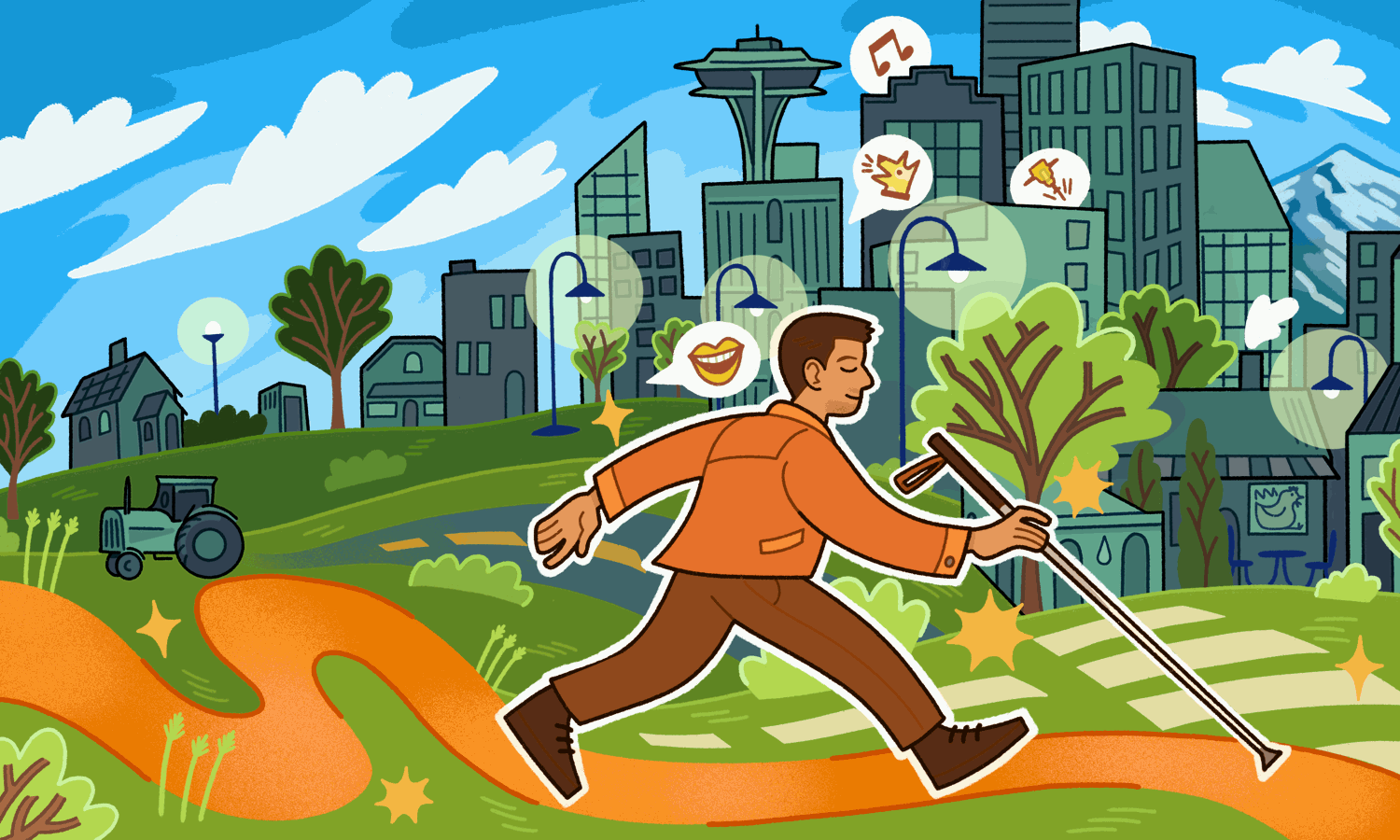
LAUREN IBAÑEZ / NEXTGENRADIO
What is the meaning of
home?
Carrie Cantrell speaks with Miguel Chavez, a disability advocate, in Portland, Oregon. Born blind and raised in rural Washington, he speaks with firsthand knowledge of the importance of accessibility and creating opportunities for others that lead to empowerment. Today, Miguel considers home to be his community of chosen family, friends, and co-workers who all share the same goal — to spread kindness in the world.
Through opportunity, advocacy and community, Miguel Chavez creates home in a kinder world
Listen to the story
Click here for audio transcript
Miguel Chavez: For me, my community is huge because I have friends that I’m really close to. I love networking with people and just showing people that there’s still kindness in this world.
So my name is Miguel and I’m Latino. I just turned 25. I am currently finishing up my Bachelor’s at Eastern Oregon University in business administration.
I am blind, so I use screen reader software that reads text to speech.
(Miguel’s screen reader speaks rapidly in a mechanical tone)
So, we are in my apartment by Interstate Avenue. And so you guys can hear the traffic and the background and the –
I take some walks here in the neighborhood, around the block. Interstate is probably one of the scariest streets, having to cross being blind, because it’s just so wide and there’s just a lot going on.
I embrace my blindness. And I think that’s something that takes a long time. Regardless if you’ve been blind all your life, or been blind for a few years, or a few months, or a few days, it’s normal. A lot of blind people go through that.
So, for me, I grew up in a very small town in eastern Washington where resources were very limited.
I didn’t feel close to a lot of my family members because they thought of blindness as like, something to pity or something to feel bad about and it really did affect me growing up.
I didn’t have a lot of resources for the blind. I was the only blind person living in the small town and that was very difficult making friends because I really couldn’t connect with kids my age. They were driving tractors while I did not really connect with them.
Most of my friends were either, like, working in the fields and of course they didn’t want me climbing up, you know, trees to pull fruit down. So that wasn’t really a thing I could do. And it kind of was a bit isolating not having other blind people like myself to learn from and just, to kind of have an experience of connecting with them.
One of the closest people was my braille teacher, Deana Harty. Deana and I worked together to complete three years learning braille in one year. My parents didn’t know how to advocate for me, and so basically she began to teach me how to advocate for myself at a very young age, which I really appreciate that till this day.
The first time I left home and went into an actual city, I was around 17 years old and I went to the Youth Employment Services Program for the Blind, where in this program – it takes place in Seattle, Washington. Mind you guys, I had never really been into a real city. I was really overwhelmed with like so many sounds and smells and people running all over the place, it was so scary.
And it, like, kind of gave me the spark to, like, to say to myself that, ‘hey, like, if I can cross all these streets in Seattle, I can do anything that I want and set my mind to.’
Living with other blind people for the very first time, creating meals, going to the store, taking the bus system all over Seattle – I never knew how much it would affect me, emotionally, mentally.
It meant so much to me. This experience meant so much to me. For the first time, I felt I had friends.
Independence for me and accessibility, they mean the world to me. Independence doesn’t just mean to have my own place or have my own place of well being, and have a job and go to school, and do all the million different things I love doing in and outside of school.
Accessibility, it means having access to everything that everyone else has access to. And so I’ve had to learn to advocate for not just for myself, but for all other people, all people with disabilities, regardless of their inner or exterior disabilities.
I’ve learned to be patient with myself.
I’ve learned to love myself for who I am as a person.
Miguel Chavez, 25, can hear the yellow transit train from his kitchen table and smell chicken wings from the nearby neighborhood pub.
“So I know when their chicken’s good because I can smell it in the air if I go outside,” Chavez said. “I’m like, ‘Okay, so this day the chicken needs to be fried a little bit more, and on Saturdays, it needs a little bit less,’ and so I kind of find it hilarious that I could just tell by the smell.”
In the North Portland apartment he shares with his partner, Chavez has come to know the community around him intimately.
“It’s really funny,” he said. “When I take Uber home, or I’ll take Lyft, or a transit home, I know we’re getting close because I kind of memorized the streets, and so when we go on to Interstate [Avenue] and are gonna turn onto Massachusetts [Avenue] and we do the sharp turn, I’m like, ‘Okay, I’m close to the house, I know where to go now.’
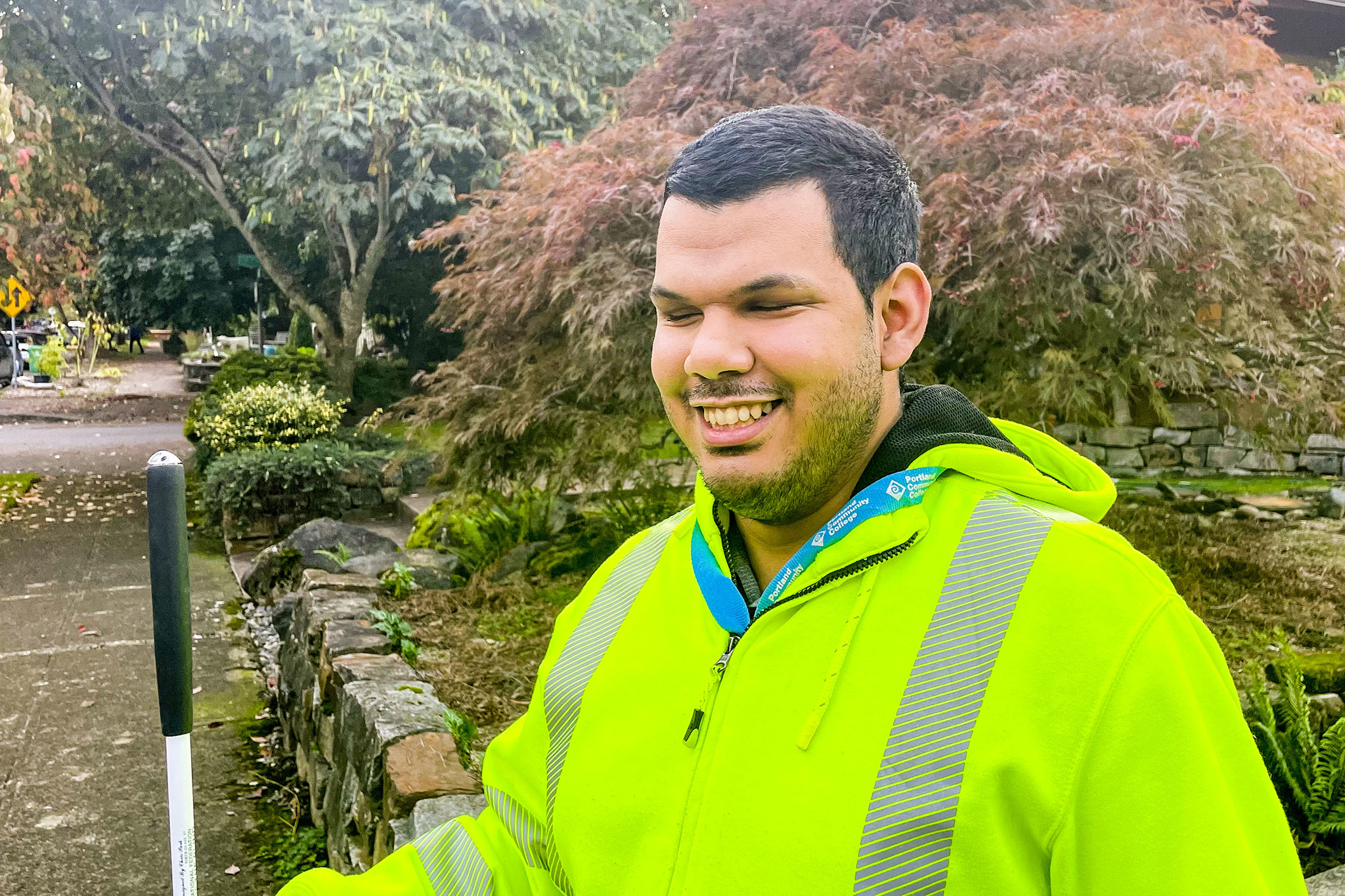
Chavez laughs outside his home in North Portland on October 23, 2023. He found community through advocacy for others in his position as an accessibility reviewer for Clark College.
CARRIE CANTRELL / NEXTGENRADIO
Chavez was born blind. He grew up in Basin City, Washington, a town with no streetlights, stoplights, or sidewalks and very few educational or professional opportunities for people with low or no vision. Some members of his family viewed blindness as something to pity. He also felt isolated from his peers and sighted siblings, understanding from a young age that he would have to do things differently from everyone else to succeed.
“[It] was very difficult making friends because I really couldn’t connect with the kids my age,” he said. “Most of my friends were working in the fields, and of course, they didn’t want me climbing up trees to pull fruit down, that wasn’t really a thing I could do.”
His patience for a different life outweighed his frustration. He dreamed of leaving his small hometown and exploring what the wider world had to offer. With his mentor and teacher, Deana Harty, Chavez embraced academics, learning to read and write in braille.
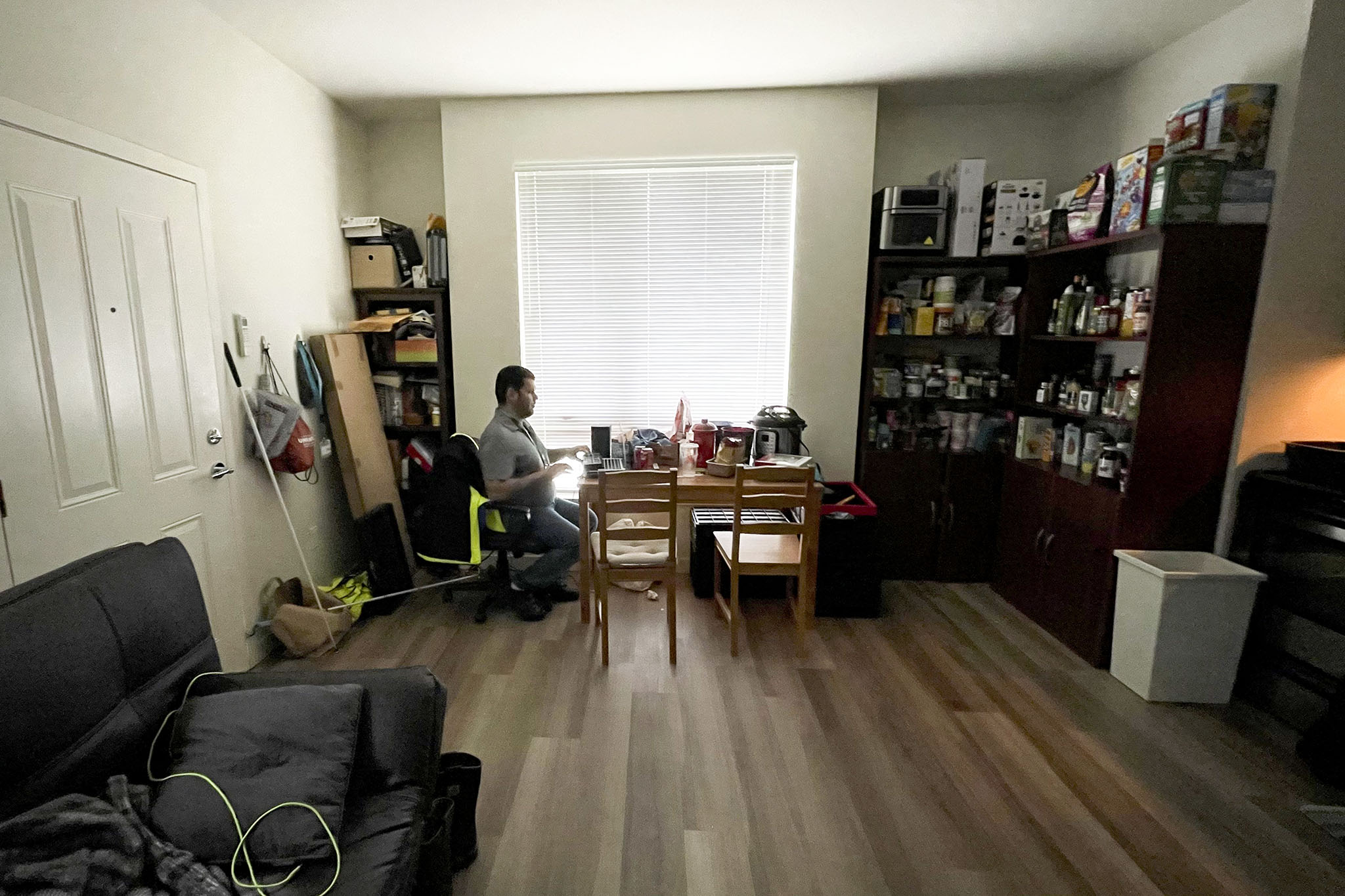
Miguel Chavez sits at his kitchen table workstation on October 23, 2023. Chavez moved to Portland, Oregon, in July 2022.
CARRIE CANTRELL / NEXTGENRADIO
Deana and I worked together to complete three years of learning [material] in braille in one year. My parents didn’t know how to advocate for me … so basically she began to teach me how to advocate for myself at a very young age, which I really appreciate till this day
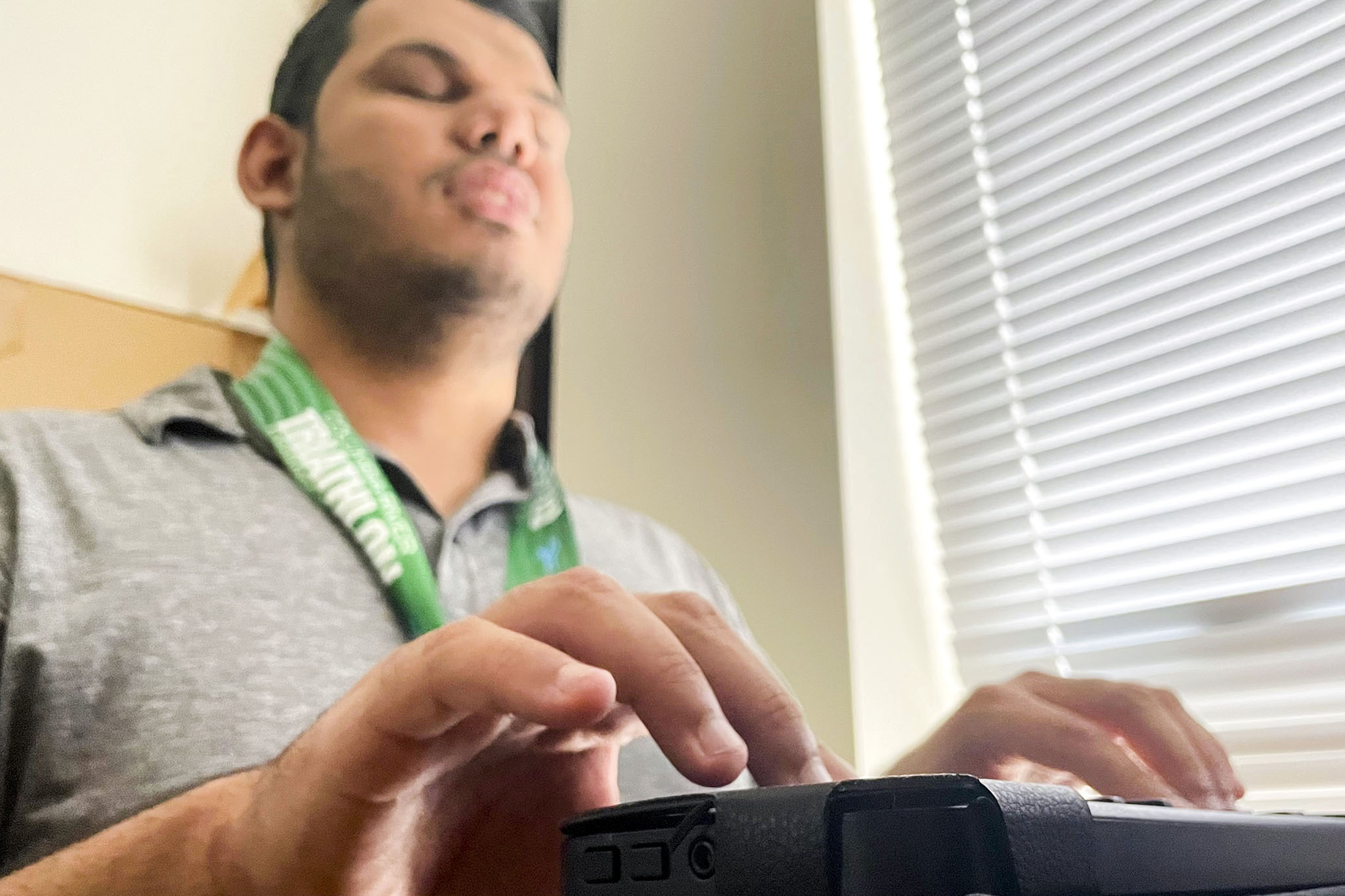
Chavez uses a braille-display keyboard to read text from his laptop on October 23, 2023. Chavez was taught to read and write in braille by his mentor, Deana Harty.
CARRIE CANTRELL / NEXTGENRADIO
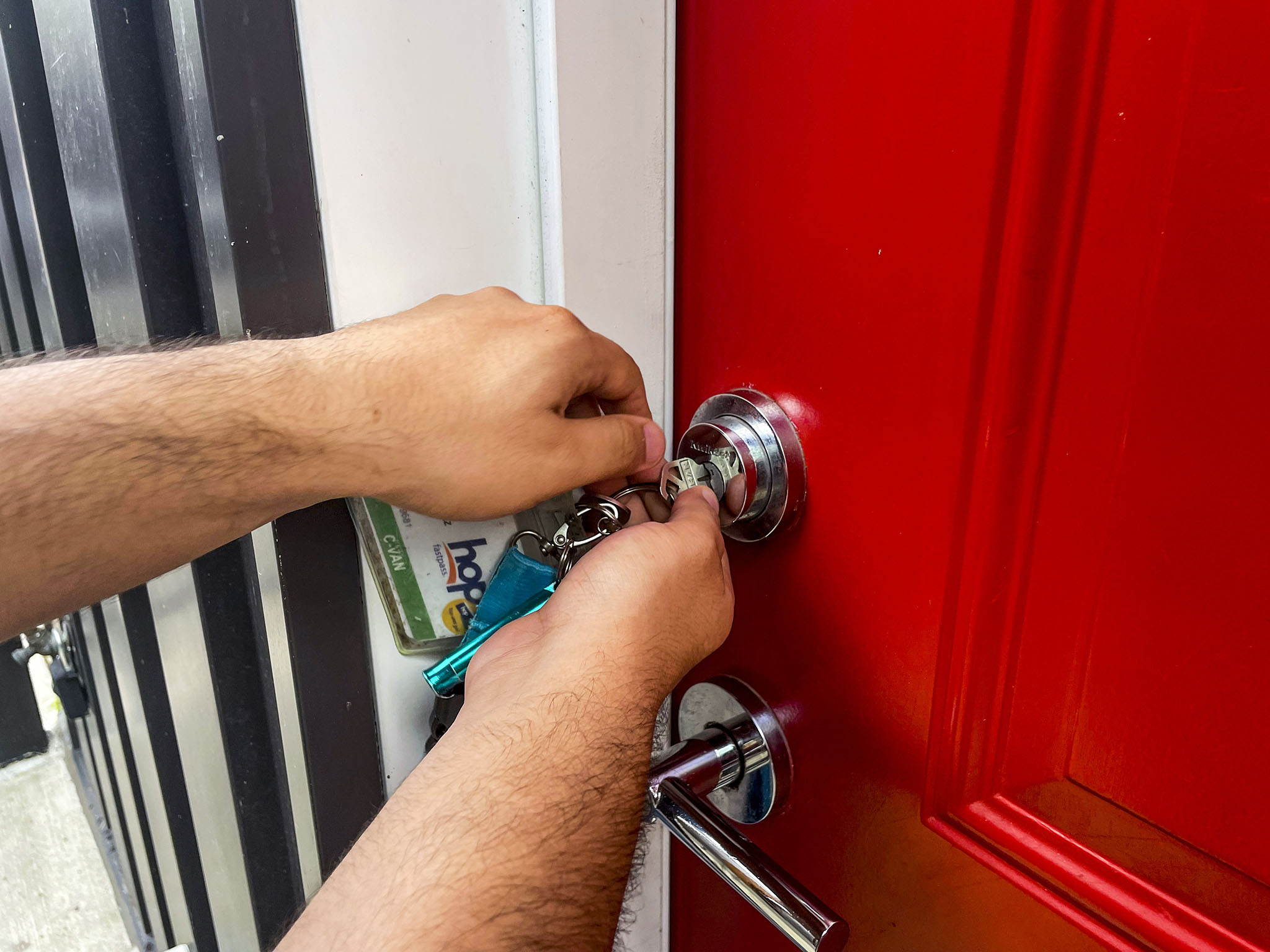
Chavez opens the door to his apartment on October 23, 2023. He moved into a ground level abode for greater accessibility.
CARRIE CANTRELL / NEXTGENRADIO
…my goal with my community is to share a lot more kindness and empathy because we need more of that in today’s world and today’s society.
“And so Deana and I worked together to complete three years of learning [material] in braille in one year,” he explained. “My parents didn’t know how to advocate for me … so basically she began to teach me how to advocate for myself at a very young age, which I really appreciate till this day.”
Chavez eventually earned a spot in an internship for blind students that took him out of his rural environment and into the bustling city of Seattle, Washington. For six weeks the summer before his senior year of high school, Chavez was part of a cohort of blind students living independently and learning new skills.
“It was so scary. I was really overwhelmed with so many sounds and smells and people running all over the place and people crossing streets and buses going everywhere.”
He remembers the sound of slapping fish at Pike Place Fish Market, the smell of food he had not yet tasted, and the cacophony of different languages being spoken around him. At 17, he started earning his own money.
“It gave me a sense of freedom and independence for the very first time, being away from home,” he said. “It gave me the spark to say to myself that, ‘Hey, if I can cross all these streets in Seattle, I can do anything that I want and set my mind to.’”
The thrill of the internship inspired Chavez. He joined Living Independent for Today & Tomorrow (LIFTT), and moved across the state to Vancouver, Washington, where he began building a community of his chosen family, and started a new life that included a new definition of home.
“For me, feeling what makes home now is the community and who’s around me, and building my own family. All my close friends, the people that I really care about, the experiences I get to have, the opportunities I get to have in a bigger city.”
Learning to self-advocate inspired Chavez to advocate for others. As a TRIO mentor, he supports first-generation college students during their transition, and as they enter their careers. When he studied journalism at Clark College in Vancouver, Chavez started 2020 Visionaries, the first club for disabled students. He is now returning to work with the school’s journalism publication, The Independent, as a professional accessibility reviewer in the IT department.
“I’m getting my first full-time job, and I’m so happy … I get to help people make websites and apps more accessible for everyone, and I’m just really excited to give back to the community and have that opportunity,” he said.
Currently, Chavez is finishing his bachelor’s in business management at Eastern Oregon University. He recently participated in his first triathlon and self produces multiple podcasts about his perspective as a blind person and a Latino person. He believes home is a brave space where you can make mistakes and be accepted for who you are.
“And as the years have gone by, I’ve made sure to not just, you know, create friends at school, but also create friends out in the community. I love networking with people and just showing people that there’s still kindness in this world. And my goal with my community is to share a lot more kindness and empathy because we need more of that in today’s world and today’s society.”
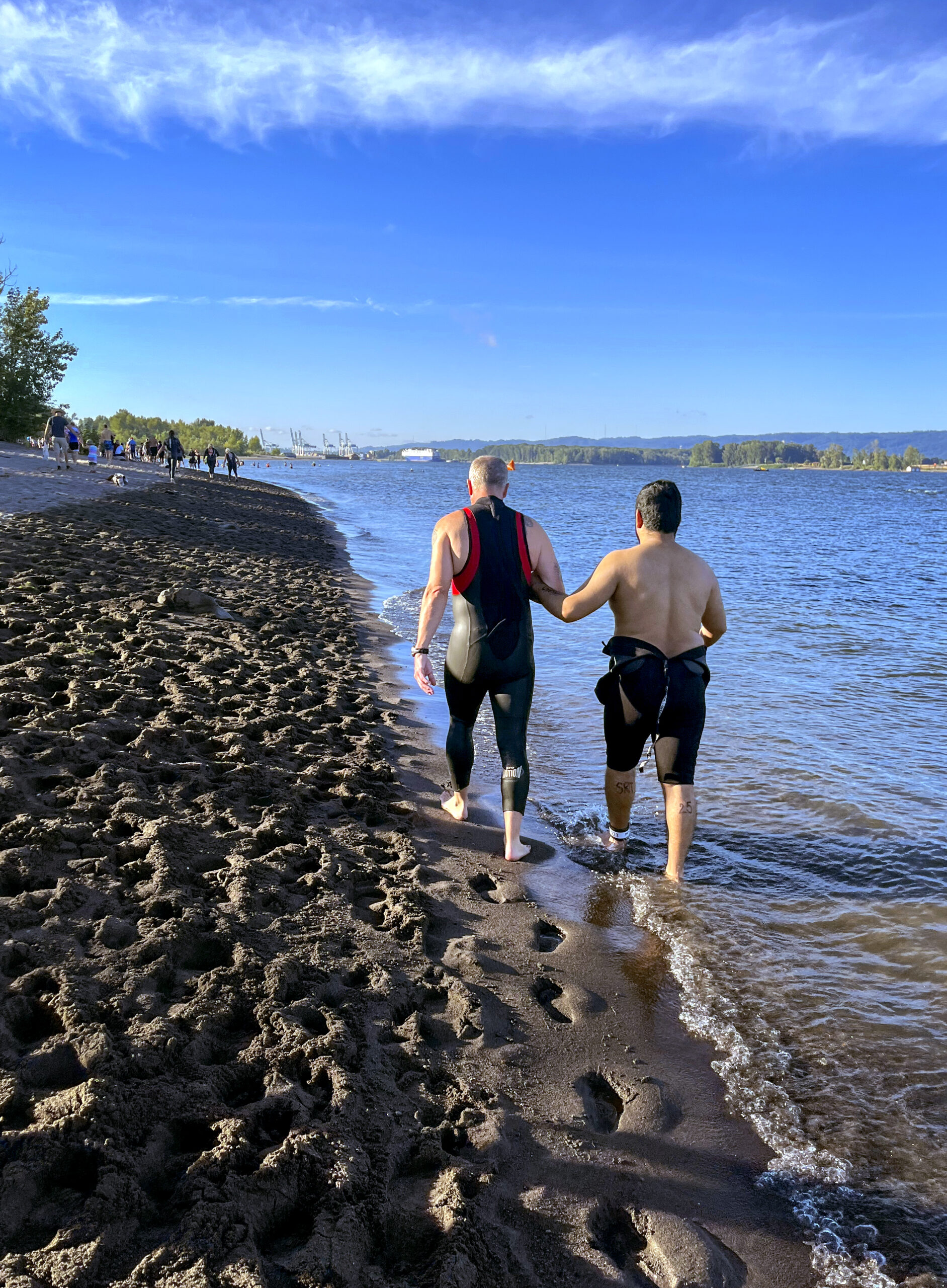
Chavez runs down the beach with his volunteer guide Robert Stewart during one leg of a triathlon. He completed the triathlon in August 2023.
Photo Courtesy of Avan Ahmad / NEXTGENRADIO
Chavez self-produces multiple podcasts about his perspective as a person who is blind and and Latino. Check out Blindness 101 and Sonidos Sin Barreras.
For me, feeling what makes home now is the community and who’s around me, and building my own family. All my close friends, the people that I really care about, the experiences I get to have, the opportunities I get to have in a bigger city.
